Support Page Content
Black Honors College Bios
Dr. Jasmin H Wade
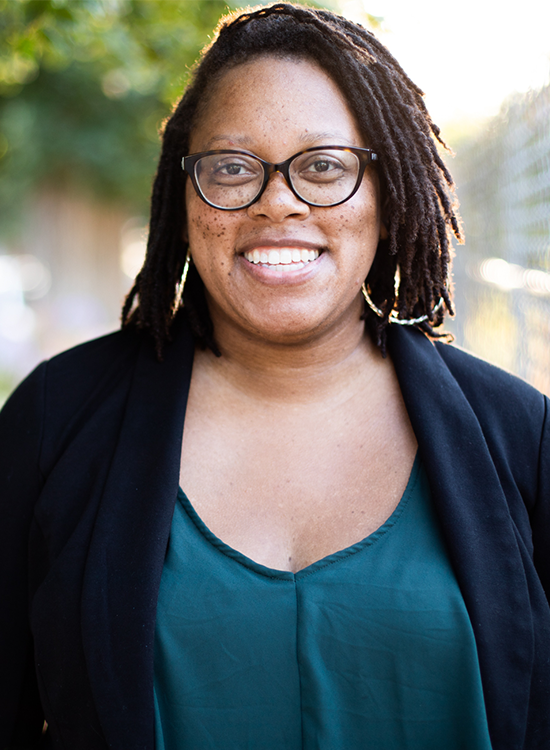
Jasmine H. Wade is an Assistant Professor of Ethnic Studies/Pan African Studies at Sacramento State University. She is a scholar of Black and Indigenous futurisms, a speculative fiction storyteller, and a DEI educational content reviewer. She received her PhD in Cultural Studies from the University of California, Davis with a focus on Feminist Theory and Research and Native American Studies. Her book project Spacetime Manipulation: Difference and Futurisms in Black and Indigenous Speculative Fiction is an interdisciplinary project that looks at speculative film, performance, and literature through the lens of the manifestos of Black Lives Matter and Idle No More.
My impression of BHC is that it will be a rigorous and supportive program for Black students and other students interested in Black life, culture, and history. It will be an important place where the bar is set high and students are given the support they need to reach that high bar.
My vision for BHC is that it be a space where excellence and courage in pedagogy, learning, and scholarship are the norm. I see it becoming a space where Black students know they will be centered, empowered, and uplifted. I also hope it will, over time, become a space where all Black students on campus can go and feel a sense of connection, where Black faculty can find other people who are asking similar questions, and where Sac State's Black community can feel safe and brave.
I am honored to be part of the initial group of faculty in the BHC. I hope to teach and develop courses in the BHC for many years. Over time, I would like to mentor students, particularly with regard to internships and community service. As a scholar of Black (speculative) literature and film, I would also love it if there was an annual book or film students engaged with during the year, and I could lead a committee on that.
Troy Nichols
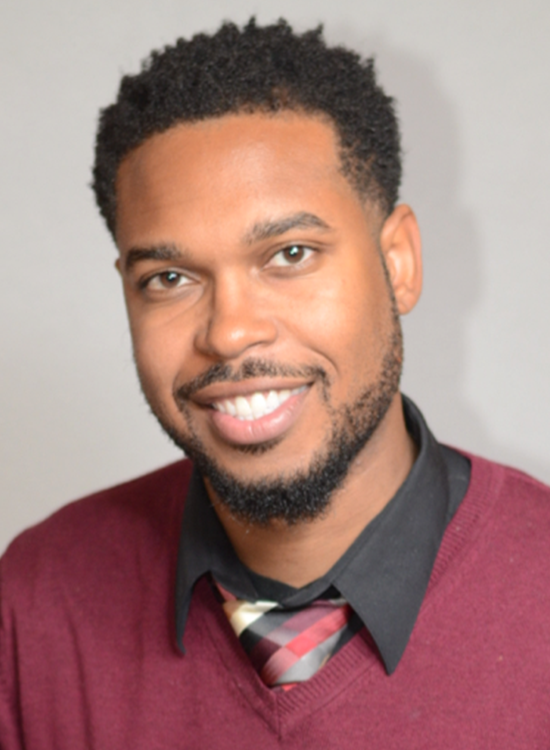
Information coming soon.
I’m thrilled to witness my alma mater taking proactive steps to address the lagging graduation rates among black students. A BHC would have been a dream for me when I was a college student. I started my college journey at an HBCU, an environment that embraced and celebrated black culture. However, financial constraints forced me to leave after my freshman year due to the burden of out-of-state fees.
The prospect of a community like the BHC would have been a game-changer for me. To have an opportunity to be in an intentional community that not only recognizes the importance of black culture but also actively promotes the contributions of black individuals across various academic disciplines and can provide culturally tailored support without students having to leave California is nothing short of a dream come true.
I am excited that future generations will have the opportunity to take my dream and live it out in a reality where they can flourish academically, culturally, and personally within Sacramento State University’s Black Honors College.
In envisioning the BHC, I see a vibrant community that embraces the diverse tapestry of the American experience. A place where students are exposed to scholars and narratives that may have been marginalized in the past, enriching their understanding of history and culture. Rooted in the principles of collective work and responsibility, the BHC will fosters an environment where every member is valued and supported.
At its core, I see the BHC prioritizing holistic education, nurturing not only academic excellence but also the mental, physical, emotional, environmental, spiritual, occupational, financial, and social well-being of its students. This comprehensive approach recognizes that true success encompasses more than just academic achievement—it encompasses the entirety of the student experience.
I firmly believe that the BHC will serve as a beacon of inspiration for other universities to create a more inclusive and equitable higher education landscape.
I envision myself actively engaging in ways that contribute to the thriving success of students within the BHC. Primarily, I see myself offering support through mentorship, actively participating in community engagement initiatives, and leveraging my expertise in Recreation and Leisure studies.
Through mentorship, I aim to provide guidance, encouragement, and support to students, helping them navigate challenges and pursue their academic and life goals with confidence. Additionally, by actively engaging with the community, I aspire to foster connection and create spaces for students to meaningfully engage with their surroundings.
Moreover, within the realm of Recreation and Leisure studies, I am excited to bring my expertise to the table. I intend to challenge students to critically examine the intersectionality of their leisure experiences and personal/social identities, encouraging them to explore how cultural backgrounds, interests, experiences, and history continues to shape our reality the world we live in.
Dr. Michele Foss-Snowden
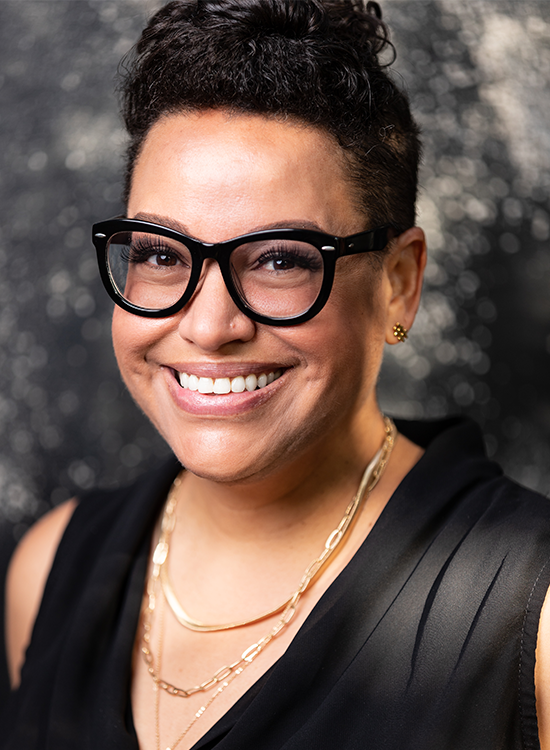
Dr. Michele Foss-Snowden (she/her) is a third-generation educator, a speaker, a podcaster, and an activist across multiple causes. She is currently Professor of Rhetoric and Media in the Department of Communication Studies at Sacramento State University. An award-winning instructor, she regularly teaches classes including Television Criticism, Rhetoric and Social Influence, Media Aesthetics, and Media and Culture. She has mentored more than 100 students from historically marginalized populations through the process of applying to and successfully completing graduate school. She also maintains an active research agenda, often centering on the intersections of race/ethnicity and gender in communication locations including television, film, fandoms, and social media. She received her bachelor's degree from Stanford University, her master's degree from the University of California, Davis, and her Ph.D. from the University of Florida. She's a proud Trekkie, a Sacramento Kings fan, and a walking jukebox when it comes to music from the totally rad 1980s.
After the racial uprising of 2020, many companies, organizations, and institutions talked a good game about recognizing, supporting, and centering the notion of justice for Black people. But when it came time for these entities to walk the walk instead of just talking the talk, they forgot or rescinded their commitments and returned to their regularly scheduled practices of inequity, discrimination, and racial aggression. The BHC is Sacramento State's refusal to go back on its word. The BHC is Sac State keeping its promise.
I see the BHC becoming a Black excellence juggernaut, just absolutely demolishing any challenge placed in its path. I see the BHC being able to show and prove right out of the gate. Finally, I see the BHC gaining national and international attention, attracting the best and the brightest from across the country and abroad.
Our BHC students/scholars will be our finest ambassadors, and so one of my main responsibilities will be making sure they are confident and prepared in presentational speaking situations. I also have a proven track record of helping students successfully navigate the graduate school journey (from applications to commencement). I would love to work within the BHC to guide our students who develop an interest in obtaining education beyond the bachelor's degree.
Dr. James W. Reede
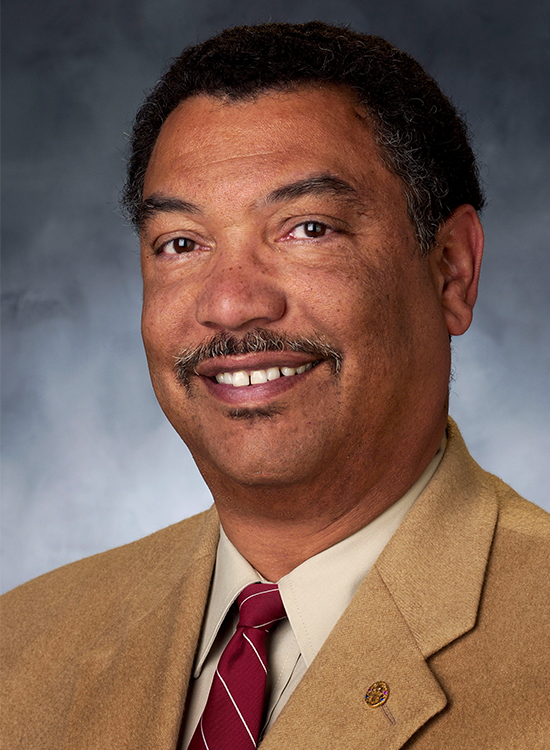
Originally from Chicago, James came to California in 1973. Upon his honorable discharge from the Air Force in 1974, he ignited his community activism. In San Jose, he was a Housing Commissioner for six years, on the School Board for five, and was a founding member of the Santa Clara Valley Urban League.
James was a member of the Congressional Black Caucus' Energy Braintrust for six years due to his role in the Nuclear Industry as a Process Control Engineer at General Electric, and his role in the Wind Power Industry as the first and only Black Windfarm Developer.
His community activism has continued since arriving in Sacramento in September 1990.
He Co-Chaired the 1991 and 2001 Redistricting Project that redrew the County Supervisor Districts, City Council Districts, the State Senate & Assembly districts and other jurisdictions in Sacramento County. For 5 years he was the Northern California NAACP Political Action Chair and also served as Branch 1st Vice-President.
James is a Life Member of KAΨ Fraternity and third generation Kappa. He previously served as Polemarch (President) of the Sacramento Alumni Chapter for 6 years and served on the Western Province Board of Directors for three years. At the National level he served on the Elections Committee for 5 Conclaves.
James is past Vice-Chairman of the City & County Human Rights-Fair Housing Commission, served for 8 years as Chairman of the United Negro College Fund for Sacramento Valley raising over $3.2 Million and, chaired Regional Transit's Community Advisory Council for the South Sacramento Light Rail Project.
He has served on the Boards of FamiliesFirst Foster Care Agency, Habitat for Humanity, United Way, the VISIONS-RITES OF PASSAGE Editorial Advisory Committee, and as a Consultant to the California Dept of Education, Gender Equity Division.
His efforts for our youth include co-founding and organizing for the first 7 years starting in 1990, the Northern California African-American Young Male Conference that averaged over 800 attendees, the annual Black College Faire and African-American Student Career Conferences. He is an active mentor and member of the 100 Black Men of Sacramento. He is also an active Prince Hall Mason
James was honored by the Sacramento Urban League with the 1996 Community Service Award, was recipient of the 1995 Human Rights Award from the Human Rights-Fair Housing Commission, and was recognized as the 1994 Outstanding Community Leader at the Sacramento Achievement Awards.
He has spoken nationally over 250 times on the topic of Black Inventors to K-12 schools, colleges and groups. He was Guest Curator for the Sacramento Discovery Museum’s Black Inventors Exhibit, and has delivered Academic Papers on the topic at both national and international conferences. He was instrumental in achieving historical status for Negro Bar, now Black Miners Bar on the American River at Folsom, CA.
James is a 1995 Charter graduate of the Sacramento City Management Academy, and in 1998 completed a Master’s Degree in Public Policy & Administration at CSU-Sacramento. He was selected by the Chancellor of the California State University system for the Doctoral Incentive Program and completed his doctorate in Organization & Leadership in Public Resource Management at the University of San Francisco in May 2003. He was named the 2003 Outstanding Doctoral Graduate by the University.
He has been a part-time Professor of Environmental Sciences at CSU Sacramento since 2003. He retired as an electric transmission systems engineer from the California Energy Commission in 2017. He is married to the former Cheryl Matlock (CSUS BA ’86 & MS ’09), and has two children. Jessica is a 2015 CSU-Sacramento Graduate, and James III is a 2017 Jackson State University Graduate. Both have since earned Graduate Masters Degrees.
My impression of the BHC is that it is a continuation, updating and the additional focusing of the original vision of the Cooper-Woodson College Enhancement Program.
My vision of, and for the Black Honors College, is to provide students with the now-necessary academic, professional, and societal skills to become productive contributors to our community specifically, and society as a whole.
I plan to bring to my primary role as an African-American Professor my extensive education, training and accomplishments in the fields of environmental science, renewable energy and electrical power engineering.
I see my other role as bringing the breadth and history of my community activism experiences and contributions to a receptive classroom. Both of which are necessary for the future of our society.
Dr. Jason Thompson
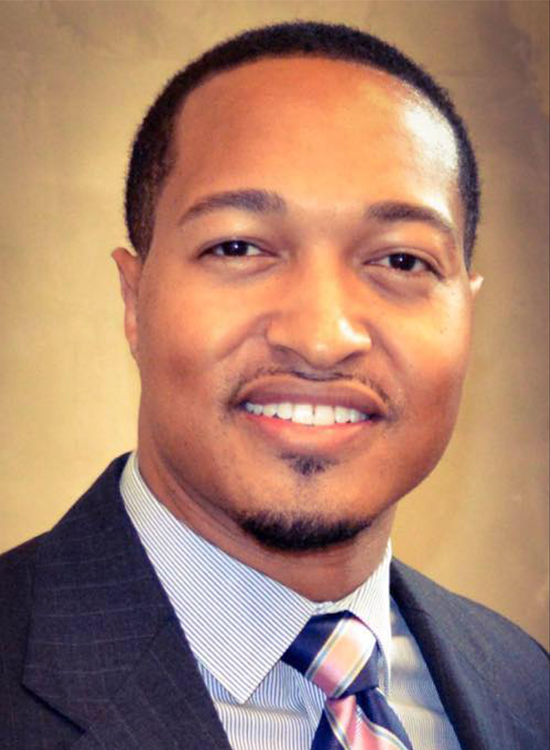 Jason Thompson (PhD, Northwestern University) believes that the core values of equity and belonging are inextricably linked with intellectual and artistic excellence. This belief has served as a common thread throughout his more than 20 years in the profession as a public-school music teacher, university professor, and administrator. His courses and research focus on socially engaged practices in the arts, music participation as civic engagement, and how culture influences and mediates the musical experience. Dr. Thompson's scholarly contributions include choral scores published by GIA Music and Hinshaw Music, as well as articles in professional journals such as Music Education Research and Music Educators Journal. He is a co-editor of the book If Colors Could Be Heard, They’d Paint Wondrous Tunes (Intellect Books), which is a tribute to, by, and for many music educators, artists, activists, and questioners who see their own stories as an intimate and essential part of music education and teaching. Dr. Thompson previously served as Interim Director of Music Education at NYU's Stienhardt School of Education,Culture, and Human Development and as a graduate faculty member at ASU's Herberger School of Design and the Arts before joining Sacramento State.
Jason Thompson (PhD, Northwestern University) believes that the core values of equity and belonging are inextricably linked with intellectual and artistic excellence. This belief has served as a common thread throughout his more than 20 years in the profession as a public-school music teacher, university professor, and administrator. His courses and research focus on socially engaged practices in the arts, music participation as civic engagement, and how culture influences and mediates the musical experience. Dr. Thompson's scholarly contributions include choral scores published by GIA Music and Hinshaw Music, as well as articles in professional journals such as Music Education Research and Music Educators Journal. He is a co-editor of the book If Colors Could Be Heard, They’d Paint Wondrous Tunes (Intellect Books), which is a tribute to, by, and for many music educators, artists, activists, and questioners who see their own stories as an intimate and essential part of music education and teaching. Dr. Thompson previously served as Interim Director of Music Education at NYU's Stienhardt School of Education,Culture, and Human Development and as a graduate faculty member at ASU's Herberger School of Design and the Arts before joining Sacramento State.
Dr. Raghu Trichur
 My training in political economic anthropology and understanding of US and global history is strongly influenced by the insights provided by progressive black intellectual traditions and debates. I have been conducting ethnographic research in Goa, India since the mid 1990s. Exploring tourism development and its related discourses, my research contributes to our understanding of how Goa (an ex- Portuguese oversees province) is incorporated and imagined as part of the postcolonial Indian nation-state. As a logical extension of my scholarly interests, I also study the decline of secularism in postcolonial India and the reproduction inequities in the United States.
My training in political economic anthropology and understanding of US and global history is strongly influenced by the insights provided by progressive black intellectual traditions and debates. I have been conducting ethnographic research in Goa, India since the mid 1990s. Exploring tourism development and its related discourses, my research contributes to our understanding of how Goa (an ex- Portuguese oversees province) is incorporated and imagined as part of the postcolonial Indian nation-state. As a logical extension of my scholarly interests, I also study the decline of secularism in postcolonial India and the reproduction inequities in the United States.
This scholarly orientation has been foundational to my development as a teacher/scholar at CSUS since 2002. I have developed and taught numerous teach courses and collaborated with faculty across the campus who share a commitment of exposing students to critical Black intellectual traditions and their continued relevance to addressing social issues of the day. I have served as a department chair for nine years and have been invited to serve on numerous university initiatives geared towards program building and student success. I am very familiar with the opportunities and institutional challenges and processes of program building and 'wholistic' student success. At this stage of my career, I view the possibility of participating in the establishment and growth of the Black Honors College as a once in a lifetime opportunity to participate in the creation of a unique learning environment that foregrounds Black history, life and culture and nurtures intellectual growth and curiosity, fostering equity minded global citizenship.
Dr. Jas Pannu

Associate Professor, Statistician, Explorer of Data, Advocate for Inclusive Pedagogy.
As an Associate Professor in Mathematics and Statistics at Sac State since Fall 2019, with previous academic endeavors in the dynamic realm of Texas, I am deeply committed to fostering an inclusive learning environment. My journey into statistics began at Eastern Michigan University, leading to a Ph.D. from Auburn University in 2015, where my passion for teaching and research flourished. Consulting as a statistician adds an extra layer of fulfillment to my professional journey.
Academic Passions
Driven by a fervent curiosity for data and statistical analysis, I am dedicated to unraveling patterns and insights. My pedagogical approach prioritizes inclusivity, ensuring that every student feels empowered and valued in the learning process. Through innovative teaching methods and a commitment to diversity, equity, and inclusion, I strive to cultivate a classroom environment where all voices are heard and celebrated.
Family & Fun
Beyond academia, I find joy in the embrace of family life. Blessed with two bundles of joy, Sifti and Pernam, each moment is a treasured adventure. In my leisure time, I indulge in culinary creations, immerse myself in cinematic wonders, ponder the mysteries of the universe, and embark on explorations with loved ones.
Life Motto
"Embrace curiosity, pursue knowledge, and cherish the diversity of human experience."
My impression of the Black Honors College (BHC) is one of immense admiration and excitement. I see it as a groundbreaking initiative that fills a crucial gap in higher education by providing a specialized academic environment focused on Black history, life, and culture. The BHC's emphasis on offering enhanced co-curricular experiences, specialized coursework, and research opportunities signifies a commitment to fostering academic excellence and cultural understanding among its students. I believe that the establishmentof the BHC reflects a progressive and inclusive approach to education that celebrates diversity and empowers students to explore and engage with issues relevant to the Black community.
My vision for the Black Honors College is to see it become a thriving academic community that serves as a beacon of excellence in interdisciplinary education and cultural enrichment. I envision the BHC as a hub for innovative scholarship, where students and faculty collaborate to explore the intersections of Black history, life, and culture with various academic disciplines. I hope to see the BHC inspire students to become critical thinkers, leaders, and advocates for social justice, equipped with a deep understanding of the contributions and challenges faced by the Black community. My vision for the BHC extends beyond the classroom, encompassing vibrant cultural events, community engagement initiatives, and partnerships that promote dialogue, awareness, and positive change.
Within the Black Honors College, I see myself playing a multifaceted role that combines my expertise in mathematics and statistics with a passion for promoting diversity and inclusion in higher education. As a faculty member, I envision myself contributing to the BHC through teaching courses that integrate mathematical and statistical concepts with themes of Black history and culture, thereby enriching students' educational experiences and fostering interdisciplinary learning. Additionally, I see myself engaging in collaborative research projects, mentorship programs, and community outreach efforts aimed at advancing the goals and objectives of the BHC. Through active involvement and leadership within the BHC, I aspire to contribute to its continued growth, impact, and success in empowering students and promoting academic excellence and social justice.
Dr. Data D. Barata (PhD)
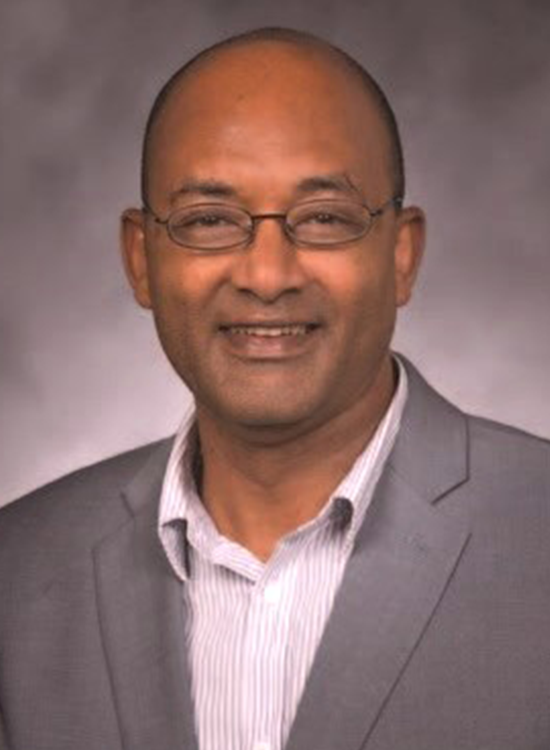 Professor of Anthropology and board chair of the Center for African Peace and Conflict Resolution at California State University, Sacramento. His research agenda is centered on understanding connections between identity, power and inequality as manifested in the material conditions of multiple identity-bearing persons. While his research is especially focused on Ethiopia and the Horn of Africa, he has done field research also in Mali, Germany and California. He has published extensively on contemporary issues including inequality and identity; ethnicity and cultural rights; cultural and national citizenship; land policy and property rights, governance and social justice; war/conflicts and (re)mediation. His most recent book is Contesting Inequality, Identity and Rights in Ethiopia. Routledge, 2018.
Professor of Anthropology and board chair of the Center for African Peace and Conflict Resolution at California State University, Sacramento. His research agenda is centered on understanding connections between identity, power and inequality as manifested in the material conditions of multiple identity-bearing persons. While his research is especially focused on Ethiopia and the Horn of Africa, he has done field research also in Mali, Germany and California. He has published extensively on contemporary issues including inequality and identity; ethnicity and cultural rights; cultural and national citizenship; land policy and property rights, governance and social justice; war/conflicts and (re)mediation. His most recent book is Contesting Inequality, Identity and Rights in Ethiopia. Routledge, 2018.
Dr. Rebekkah Mulholland
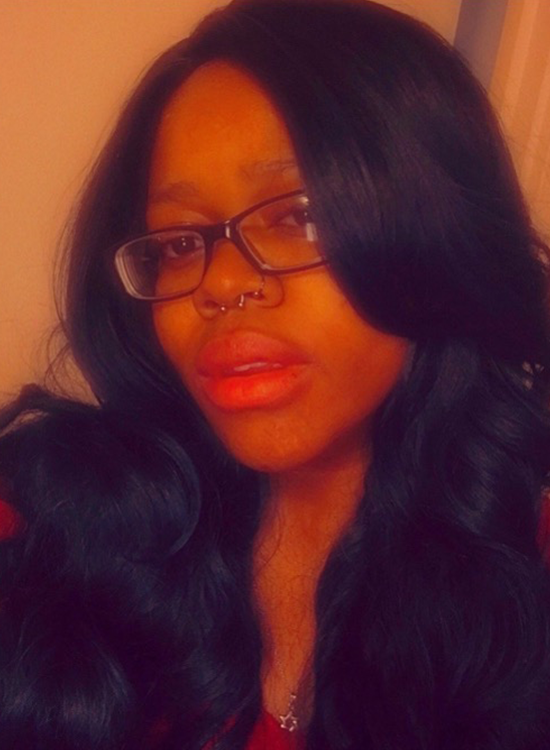 Rebekkah Mulholland is an Assistant Professor of History at the California State University, Sacramento. Mulholland's research focuses on transgender and queer studies, as well as on the history of race, gender, sexuality, class, and social movements in United States history. Mulholland recently completed her dissertation, “Historical Erasure is Violence: The Lives and Experiences of Black Transgender Women and Nonconforming Women of Color in the 19th and 20th Century.” In 2020, Mulholland wrote, directed, and produced a film series, “Civil Rights: Stories to Inspire Change,” for the Benjamin L. Hooks Institute for Social Change at the University of Memphis where she completed her doctoral studies.
Rebekkah Mulholland is an Assistant Professor of History at the California State University, Sacramento. Mulholland's research focuses on transgender and queer studies, as well as on the history of race, gender, sexuality, class, and social movements in United States history. Mulholland recently completed her dissertation, “Historical Erasure is Violence: The Lives and Experiences of Black Transgender Women and Nonconforming Women of Color in the 19th and 20th Century.” In 2020, Mulholland wrote, directed, and produced a film series, “Civil Rights: Stories to Inspire Change,” for the Benjamin L. Hooks Institute for Social Change at the University of Memphis where she completed her doctoral studies.
Dr. Ayanna Yonemura

Ayanna Yonemura, Ph.D. brings over fifteen years of university and college teaching to the Black Honors College including ten years of teaching African American and Black Studies. An alumna of the University of California Santa Cruz’ Summer Bridge Program, she has an established record of teaching success with Black and other underrepresented students including in the Upward Bound Program, Summer Bridge Program, and Full Circle Project. Also, at Sac State, she regularly taught the Honors Ethnic Studies course.
A fourth generation Californian whose great-grandparents were from Oklahoma and Japan, Ayanna graduated from Kennedy High School in Sacramento. After her undergraduate years at UC Santa Cruz, she earned a M.A. in African Studies and a Ph.D. in Urban Planning from UCLA. Ayanna is a past recipient of Fulbright Fellowships to Eritrea and Germany. She has also taught at universities in Kenya and Somaliland. In her first book, Race, Nation, War, and her forthcoming book, Women, Wars and Public Policies, she applies a feminist, global, and comparative lens to examine racism and public policy.
The BHC is a pathbreaking initiative for holistically supporting highly motivated students, proactively expanding academic excellence, and strategically increasing diversity.
Ultimately, the BHC will provide a dynamic and inspirational model for universities nationwide which are committed to inclusion, justice, and student-centered learning.
As a BHC inaugural faculty member, my role is to support scholars and colleagues as we establish an affirming and rigorous learning community. In addition to teaching and mentorship, this role includes collaborating with colleagues to develop the specialized BHC curriculum and co-curricular seminars. Teaching BHC general education pathway courses, I create supportive learning environments where scholars (1) build on their personal and cultural backgrounds; (2) advance their knowledge of Black histories, lives, and cultures; and (3) sharpen their professional abilities. Outside of the classroom, I bring my social science, community service, and international backgrounds to mentor scholars and partner with them on research, creative endeavors, and bridging Sac State to the Greater Sacramento area and the world.
Dr. Mark B. Brown
 Mark B. Brown is Professor in the Department of Political Science at California State University, Sacramento. He studied at UC Santa Cruz and the University of Göttingen, and he received a Ph.D. in Political Science from Rutgers University. He is the author of Science in Democracy: Expertise, Institutions, and Representation (MIT Press, 2009), and publications on political representation, deliberation, expertise, climate change, and the politics of racial identity, among other topics. He teaches courses on modern and contemporary political theory, democratic theory, and the politics of science, technology, and the environment.
Mark B. Brown is Professor in the Department of Political Science at California State University, Sacramento. He studied at UC Santa Cruz and the University of Göttingen, and he received a Ph.D. in Political Science from Rutgers University. He is the author of Science in Democracy: Expertise, Institutions, and Representation (MIT Press, 2009), and publications on political representation, deliberation, expertise, climate change, and the politics of racial identity, among other topics. He teaches courses on modern and contemporary political theory, democratic theory, and the politics of science, technology, and the environment.
Dr. Christopher Towler
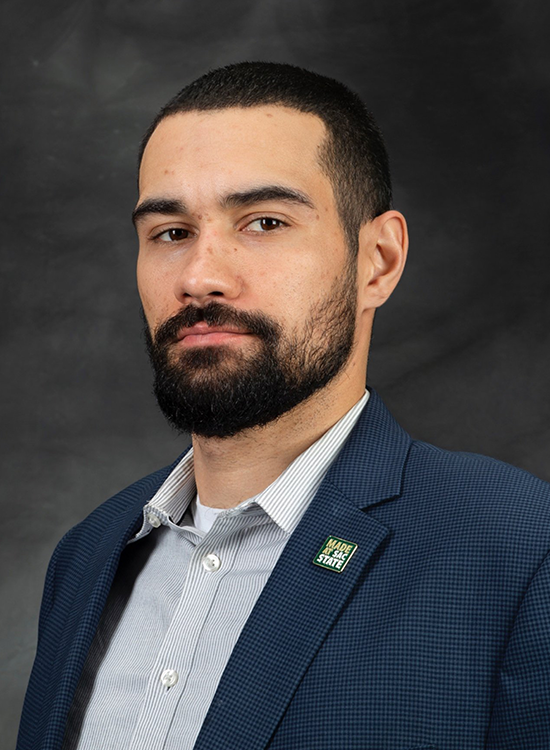 Dr. Christopher Towler is an Associate Professor in the Department of Political Science at California State University, Sacramento. His research and teaching interests broadly include American politics, race and ethnicity, and methodology. More specifically, his work examines ideological predispositions, alienation, political allegiance, and support. Recent projects examine the dynamic relationship between progressive social movements and far-right movements reacting to great social change. He received his Ph.D. and M.A. from the University of Washington, Seattle, and holds a B.A. from the University of Colorado. A former McNair and Ralph Bunche scholar, Dr. Towler was also a McNair Graduate Fellow as well as a Ford Foundation Pre-Doctoral and Dissertation Fellow. His work has been published in Perspectives on Politics, Journal of Race, Ethnicity and Politics, and Du Bois Review. Dr. Towler is currently serving as the Editor-in-Chief of the Journal of Race, Ethnicity, and Politics (JREP) and directs the Black Voter Project (BVP), a national survey project of Black Americans. Dr. Towler’s recent work is highlighted in the Sacramento Bee, Politico Magazine, Washington Post, Time Magazine, USA Today, and the Atlantic.
Dr. Christopher Towler is an Associate Professor in the Department of Political Science at California State University, Sacramento. His research and teaching interests broadly include American politics, race and ethnicity, and methodology. More specifically, his work examines ideological predispositions, alienation, political allegiance, and support. Recent projects examine the dynamic relationship between progressive social movements and far-right movements reacting to great social change. He received his Ph.D. and M.A. from the University of Washington, Seattle, and holds a B.A. from the University of Colorado. A former McNair and Ralph Bunche scholar, Dr. Towler was also a McNair Graduate Fellow as well as a Ford Foundation Pre-Doctoral and Dissertation Fellow. His work has been published in Perspectives on Politics, Journal of Race, Ethnicity and Politics, and Du Bois Review. Dr. Towler is currently serving as the Editor-in-Chief of the Journal of Race, Ethnicity, and Politics (JREP) and directs the Black Voter Project (BVP), a national survey project of Black Americans. Dr. Towler’s recent work is highlighted in the Sacramento Bee, Politico Magazine, Washington Post, Time Magazine, USA Today, and the Atlantic.
Dr. Booker Cook
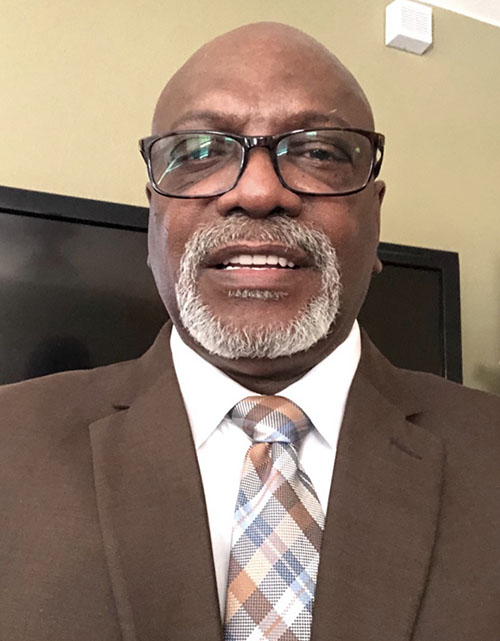 Dr. Cook upholds high the banner of student-centered pedagogy that investigates a continuum of factors contributing to static attrition rates in the university setting. The focus of his research is to better understand how to improve retention rates in higher education. His thesis addressed issues associated with high attrition rate of Black men at the university level. Additionally, his dissertation examined, through student voice, what happens during the transfer process from secondary education to higher education. His findings indicate that the orientation process may be a key factor for encouraging students to better engage with the university climate. He was able to extract new data with a closed ended questionnaire about student experiences during the transfer process.
Dr. Cook upholds high the banner of student-centered pedagogy that investigates a continuum of factors contributing to static attrition rates in the university setting. The focus of his research is to better understand how to improve retention rates in higher education. His thesis addressed issues associated with high attrition rate of Black men at the university level. Additionally, his dissertation examined, through student voice, what happens during the transfer process from secondary education to higher education. His findings indicate that the orientation process may be a key factor for encouraging students to better engage with the university climate. He was able to extract new data with a closed ended questionnaire about student experiences during the transfer process.
He is presently writing several journal articles with colleagues on how students can best navigate the university setting using contemporary research and student voice as the guiding light. He is also currently completing a book titled, School Policy Without Practice is Worthless. The Implementation Disconnect!
Dr. Cook has a doctorates degree in Educational Leadership and Policy from California State University Sacramento. He also holds a MA in Ethnic Studies from California State University San Francisco and a BA in Ethnic Studies from California State University Sacramento.
Dissertation Supervised by:
- Edward (Ted) Lasher, Chair of the Sacramento State Department of Public Policy and Administration.
- Alexander Gonzalez, 7thPresident of California State University Sacramento
- Boatmo Ati Mosupyoe, Dean of Students and Chief Academic Officer at Sacramento StateUniversity’s Black Honors College
Dr. Brittany Young
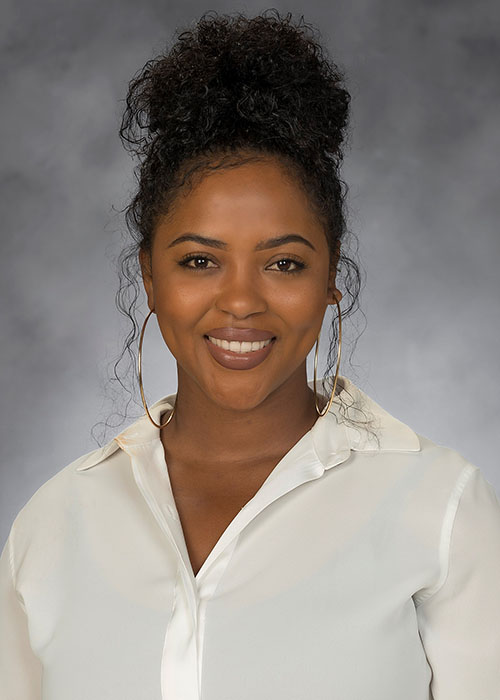 Dr. Brittany Young is an Assistant Professor in the Department of Psychology at Sacramento State. She is a developmental multicultural psychologist, with research and teaching interest in identity development, equity, student wellness, and sense of belonging in education. Dr. Young earned her M.S. and Ph.D. from the University of California Santa Cruz in Psychology with an emphasis on human development within context and culture. Her most recent projects focus on Black STEM student experiences and successes navigating higher education and exploring the role of race and gender on students wellness and success in their classrooms. Her development of the “C.A.R.E.D model” uplifts student voices and emphasizes a desire for a cultural shift in STEM classrooms that promote and reward curiosity, collaboration, and multicultural competence within faculty and peers. Additionally, Dr. Young’s dedication and passion for student success motivated her development and delivery of a Multicultural Mentorship series to assist peer mentorship success within the Psychology department.
Dr. Brittany Young is an Assistant Professor in the Department of Psychology at Sacramento State. She is a developmental multicultural psychologist, with research and teaching interest in identity development, equity, student wellness, and sense of belonging in education. Dr. Young earned her M.S. and Ph.D. from the University of California Santa Cruz in Psychology with an emphasis on human development within context and culture. Her most recent projects focus on Black STEM student experiences and successes navigating higher education and exploring the role of race and gender on students wellness and success in their classrooms. Her development of the “C.A.R.E.D model” uplifts student voices and emphasizes a desire for a cultural shift in STEM classrooms that promote and reward curiosity, collaboration, and multicultural competence within faculty and peers. Additionally, Dr. Young’s dedication and passion for student success motivated her development and delivery of a Multicultural Mentorship series to assist peer mentorship success within the Psychology department.
Elijah Martin
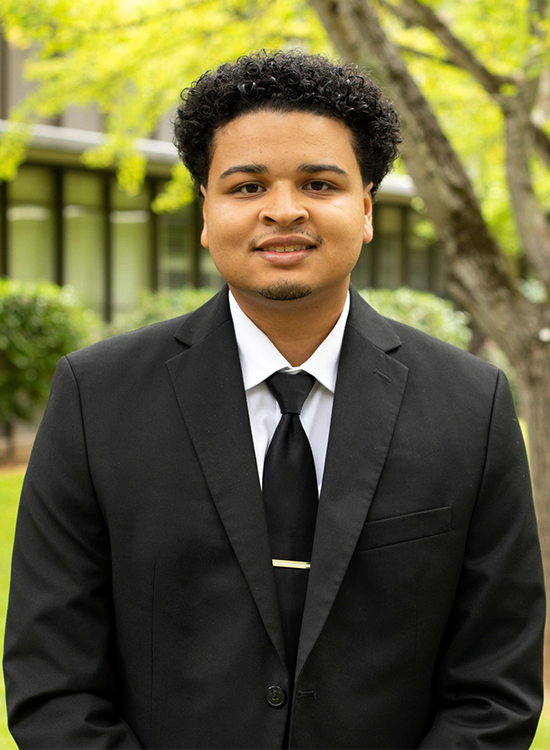 Elijah Martin is an alumnus from Sacramento State, having received his bachelor's degree in psychology.
Elijah Martin is an alumnus from Sacramento State, having received his bachelor's degree in psychology.
He is currently starting his masters degree in counseling, and hopes to serve as a career counselor in higher education.
As a transfer student from Stockton, California, Elijah aims to help fellow first-generation and underrepresented students navigate the challenges college may bring, and ensure that each student enrolled in the Black Honors College gets to the finish line.
Impression: I am excited to be a part of the first Black Honors College in the nation. The fact that President Wood came here and is acting on the need to raise our graduation rates among our underrepresented students means a lot. I wish we had the Black Honors College when I was a student.
Vision: To create an HBCU like culture and community in Sacramento. To be a prime destination for students to become the leaders of tomorrow.
Role: Outreach Coordinator.
Martinique M Baker
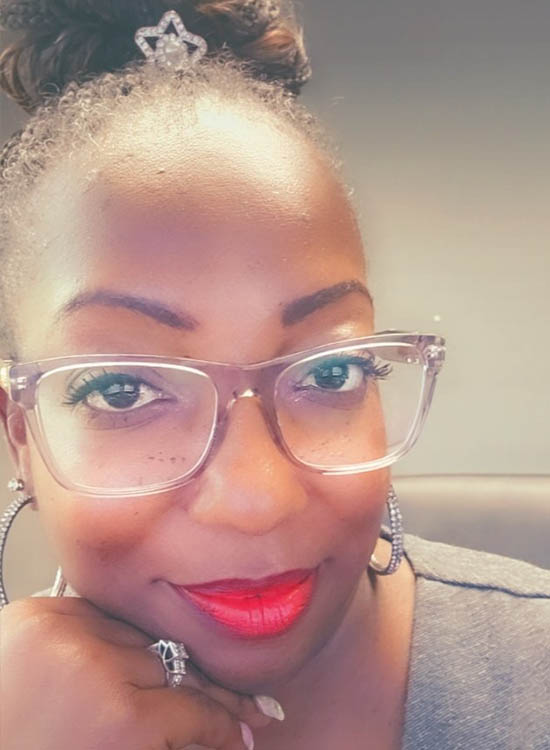 I am made at Sac State twice. One of my Aunt’s, my husband and daughter are made at Sac State. I have been a staff member for over 20 years now and I have pretty much enjoyed all of my time here. I love helping students and other staff and faculty members at Sac State. In my experience here, it is a great place to work and a great place to go to school and get a degree or several of them.
I am made at Sac State twice. One of my Aunt’s, my husband and daughter are made at Sac State. I have been a staff member for over 20 years now and I have pretty much enjoyed all of my time here. I love helping students and other staff and faculty members at Sac State. In my experience here, it is a great place to work and a great place to go to school and get a degree or several of them.
Courtney Hughes, LMFT
Courtney Hughes (she/her/hers) is a Licensed Marriage and Family Therapist who started as a mental health counselor at Sac State in 2018. She received her Bachelors in Psychology from UC Irvine in 2011 and Masters in Marriage and Family Therapy from University of Southern California in 2014. She offers a variety of mental health services for students including individual counseling and group counseling, and utilizes a trauma informed and culturally responsive approach. She has a special interest in helping to support Black students navigate the unique challenges they may face in higher education and is committed to supporting scholars in the Black Honors College thrive in each of the areas of wellness. Courtney is passionate about reducing stigma associated with receiving mental health services as well as reducing barriers to mental health care. She also believes in a holistic approach to wellness and values the importance of community healing. When working with students, her goal is to create a safe environment where students feel seen, heard, and are empowered to be their most authentic selves.
Vice President Aniesha Mitchell, J.D
Aniesha Mitchell, J.D., has served as vice president for student affairs at Sacramento State since 2024.
For over 20 years Mitchell has been advocating for student success. She has previously served as the senior associate vice president, chief of Divisional Operations, and deputy chief diversity officer for the Division of Student Affairs and Campus Diversity at San Diego State University, where she managed a $42 million dollar budget and served as the lead executive officer providing leadership and support to 480 employees and 42 departments. Prior to joining San Diego State University, Mitchell was the director of student conduct and community standards at the University of Cincinnati, director of conflict resolution and student conduct at the University of Mississippi, and program manager of conflict resolution at the University of Michigan. She began her career at Oakland University serving in roles in enrollment management and retention.
VP Mitchell earned her bachelor of arts degree in Political Science from Oakland University and Juris Doctor degree from Cooley Law School. She is passionate about student rights, restorative justice, and diversity, equity, and inclusion. Although Mitchell is licensed to practice law in the state of Michigan, she has dedicated her life to investing in our future…our students.
Dr. Robin Carter
Growing up in the Merced County town of Atwater, Robin Carter saw community service in action every day. Her parents fed homeless families, volunteered at their church, and emphasized the importance of helping people in need. Carter’s call to service propelled her to a career in social work, with a focus on helping senior citizens. Later, having earned two degrees from Sacramento State and two from the University of Southern California, she returned to Sac State in the late 1980s as a professor of Social Work and discovered a love of teaching. She served in several capacities on campus, including interim executive director for Diversity and Inclusion, interim vice provost for Faculty Affairs, and dean of the College of Health and Human Services. Carter, who retired in 2021, continues to support the community. She serves on the board of directors for the Sacramento Regional Family Justice Center, which provides services to adults and children who have suffered abuse. Additionally, she volunteers with the Sacramento chapter of the National Coalition of 100 Black Women, an advocacy group to promote leadership development and gender equity for Black women and girls. And she chaired Sac State’s 75th Anniversary committee, bringing her back to campus for parts of the 2022-23 academic year. As a professor, she connected with many students and enjoyed helping them navigate college and careers. As she rose through the administrative ranks, she mentored faculty and staff.
Dr Eric V. Gravenberg
Eric V. Gravenberg is the former Deputy Chancellor/COO for the Peralta Community College District in Oakland, California. In July 2013, he was appointed the interim President of the College of Alameda. Previously he served as the Vice President of Student Services at Merritt College for four years. He has had a distinguished 43-year career in education having served in several senior leadership positions at major universities, both public and private. He is a seasoned administrator with a successful track record in building consensus and optimizing team performance. He is currently President and CEO of The Gravenberg Group, a performance management consulting firm specializing in executive coaching and leadership development and senior associate consultant with Williams & Company. Formerly, Eric was the Vice President for Undergraduate Education at Alliant International University in San Diego. Prior to this appointment, he served as the Associate Vice President for Enrollment Management and Student Affairs at CSU, Sacramento where he helped to grow the university’s enrollment to unprecedented levels. His illustrious career includes serving as Vice President with Noel Levitz. His consulting expertise was developing collaborative strategies between academic instruction and student services to improve retention. Additionally he served as the Associate Vice President for Enrollment Management at Howard University, Director of Admission at the University of California, Riverside, Director of the Learning Center at Humboldt State University, Enrollment Management Consultant for the United Negro College Fund (UNCF), and was the Statewide Associate Dean for Student Affirmative Action at the California State University Chancellor’s Office.
Dr. Frank Harris III
Dr. Frank Harris III is a professor of postsecondary education and co-director of the Community College Equity Assessment Lab at San Diego State University (SDSU). Dr. Harris is also a senior strategist in SDSU’s Division of Campus Diversity and Student Affairs, and, in 2021–2022, the SDSU President named Harris the faculty athletics representative. In Fall 2022, Harris began his appointment as associate dean of diversity, equity, and inclusion in SDSU’s College of Education, and he received the SDSU Alumni Distinguished Faculty Award for the 2021–2022 academic year. Dr. Harris is best known for his expertise in racial [in]equity in postsecondary education and has made important contributions to knowledge about college student development and the social construction of gender and race in college contexts. During the Obama Administration, Harris was invited to The White House to share his knowledge and expertise on the status of boys and men of color in education. He also serves on the Every Learner Everywhere Equity Advisory Board and on the Partnership for College Completion Board. Before joining the faculty at San Diego State, Harris worked as a student affairs educator and college administrator in student crisis support and advocacy, new student orientation programs, multicultural student affairs, academic advising, and enrollment services. He also served as an adjunct professor of speech communication at Los Angeles Trade Technical College. Harris earned a bachelor’s degree in communication studies at Loyola Marymount University, a master’s degree in speech communication at California State University, Northridge, and a doctorate in higher education from the Rossier School of Education at the University of Southern California.
Dr Martin L Boston
Martin L. Boston holds a doctorate in Ethnic Studies from the University of California, San Diego (UC San Diego). He is currently an Assistant Professor of Pan African Studies and Ethnic Studies at Sacramento State University. His research and teaching interests are in race and ethnicity, Black studies, social movements, cultural studies, popular culture, decolonial studies, and South African and American comparative and transnational histories. He is currently working on a book manuscript titled, “Be(Long)ing: South African Cultural Producers and the Development of a Pan-African Exilic Consciousness During an Era of Exile.”
Dr. Colette L. Harris-Mathews
Focused on Diversity, Equity, Inclusion and Belonging, Dr. Harris-Mathews is the Principal Consultant for Harris Mathews Consulting, a communication, organizational development, leadership, and educational firm. She holds a Bachelor of Arts and Master of Arts Degree in Communication Studies from California State University Sacramento and a Doctor of Education in Educational Leadership from Argosy University, San Francisco. Her Master’s thesis explored the lived experiences of African Americans in the workplace and dissertation examined mentoring African American women in California Community Colleges. Dr. Colette L. Harris-Mathews is an Emeriti California Community College Dean and Professor of Communication Studies with more than 20 years of experience in higher education as an Instructional Dean, Educational Leader, and Diversity, Equity, Inclusion and Belonging Practitioner. She held a variety of leadership positions, including Department Chair and Director for the Center For the Advancement of Staff and Student Learning, Accreditation Tri-Chair Lead, Guided Pathways Tri-Chair Administrative Lead and Founding Faculty Member for CRC’s Umoja Program. Dr. Harris Mathews was also a Lecturer at California State University Sacramento in both the Ethnic Studies and Communication Studies Departments teaching Freshmen Seminar and Introduction to Public Speaking, The Communication Experience, Group Discussion and Intercultural Communication. Dr. Harris Mathews taught Intercultural Communication and Persuasion at the University of London through Los Rios Study Abroad Program, Partner of the Northern CA Study Abroad Consortium and the American Institute for Foreign Study. Continuing her interest in studying education and culture in other countries, Dr. Harris Mathews lectured and studied at the University of Kigali and University of Ghana.
Dr. Marcellene Watson-Derbigny
Marcellene Watson-Derbigny is the Associate Vice President for Student Retention and Academic Success at Sacramento State. She is responsible for the oversight of services provided by the Educational Opportunity Program (EOP), the Faculty Student Mentor Program (FSMP), the College Assistant Migrant Program (CAMP), the Peer and Academic Resource Center (PARC), and the College Based Educational Equity Programs (CBEEP). All of the programs noted comprise the Student Academic Success and Educational Equity Programs (SASEEP) Unit, which primarily serves students from first generation and low-income communities. Marcellene also works as the Coordinator of the EOP Learning Communities Program and she has been instrumental in growing the program from one to over twenty-five different learning communities. In collaboration with various sectors of the Sacramento State campus, she has also created an academic, social, and faculty training component for the EOP Learning Communities Program. Marcellene currently serves on the California Learning Communities Consortium Task Force, chairs the Campus Educational Equity Committee, and serves as a chair of the Graduation Initiative for Sac State. Marcellene has also served as an adjunct faculty member for the Department of Psychology. She holds a bachelor’s degree in Psychology, two master’s degrees, one in Psychology and the other in Clinical Psychology, and a doctorate in Educational Psychology with a minor in Educational Administration.
Patricia Holmes
Patricia Holmes worked at California State University for 38 years until she retired in 2012. While employed there she graduated with her Bachelor’s in Sociology and her Masters Degree in Educational Administration & Leadership. She holds many certificates including Meeting and Event Planning and Conflict Resolution. Since retiring Patricia continues to support various CSUS programs, departments, and committees. She is currently working with Ms. Annie Thomas to develop Sacramento State Black Honors College (BHC) first Mentoring and Internship Programs. She also serves as an Advisory Board member for BHC. Patricia is involved in several community projects to include her most recent joint founding of “Seasoned in Sisterhood” Women’s group recently developed to support Seasoned women in the community with Gatherings.
Miss Annie Thomas
Informaiton coming soon.
Miss Faye Kennedy
Faye Wilson Kennedy is a founding member of the Black Hair and Black Hygiene Project, (BHBH), the Red Black and Green Environmental Justice Coalition (RBG EJC), Sisters Quilting Collective (SQC), the Sacramento Black Book Fair (SBBF), and the Black Parallel School Board (BPSB). She also serves as an organizer with the Sacramento Poor People’s Campaign (Sac PCC).
Faye brings a rich history of public service and community development to her roles. She has over 35 years of experience as a community organizer, human service professional, educator, and group facilitator, collaborating with diverse communities, agencies, and organizations throughout Northern California.
Faye currently serves as Chair of the Sacramento Area Black Caucus, Vice Chair of the Black Parallel School Board, immediate past Quad Chair for the California Poor People’s Campaign, and past president of the Colonial Heights Friends of the Library.
Additionally, Faye has published articles, editorial and commentaries in the Sacramento Observer, Sacramento News & Review and Sacramento Bee on homelessness, community health, environmental justice issues, community planning, public policy, children and women’s issues.
She has a bachelor’s degree in child development and cultural anthropology from CSUS, a Community College Teaching Credential in Child Development and Early Childhood Education, and certificates in Open Space Technology and Event Planning.